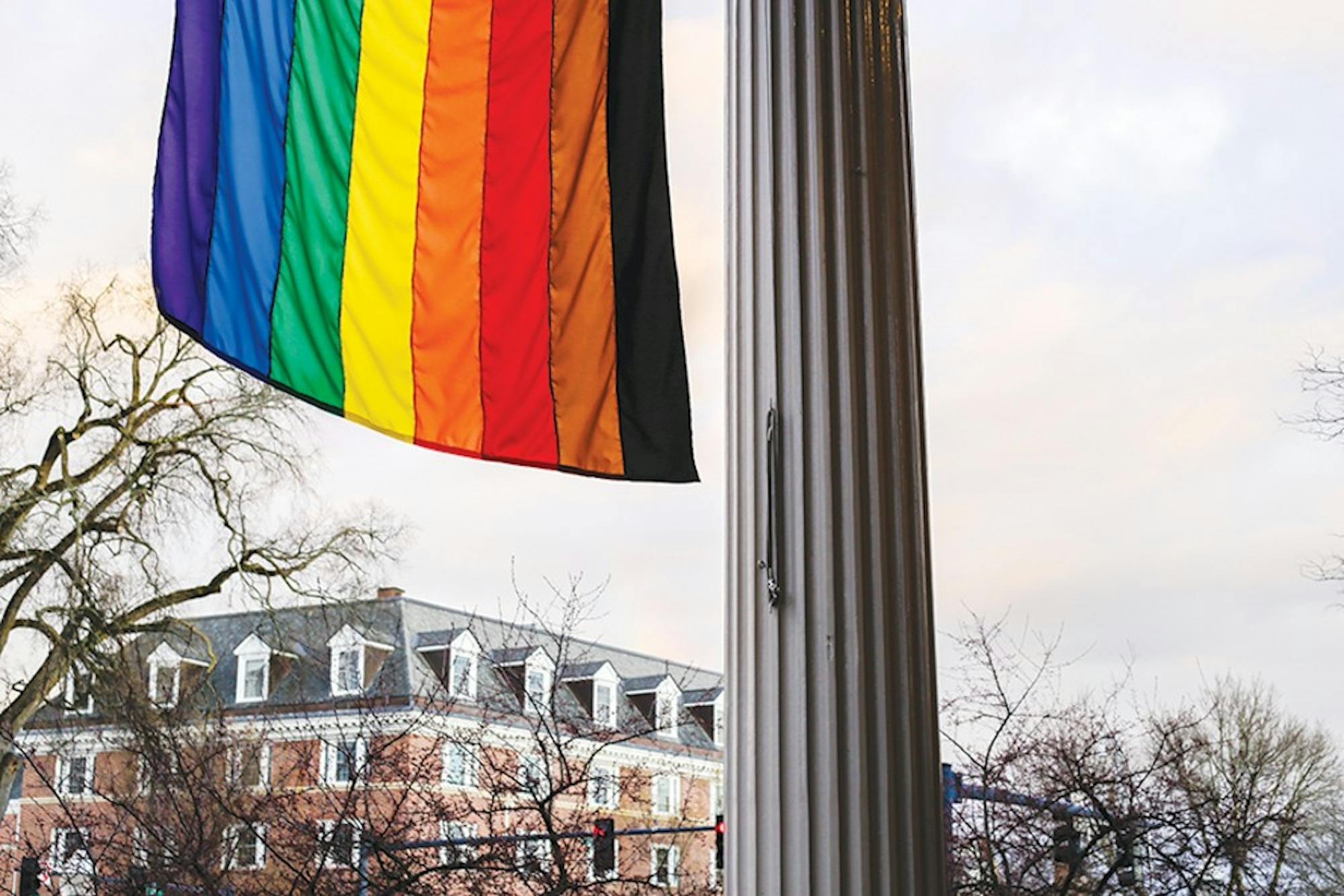Bright rainbow lights illuminated Dartmouth Hall in brilliant colors last month for Pride, a reminder of the importance of inclusivity on campus for members of the LGBTQIA+ community. While such grand displays of solidarity with queer students are a step in the right direction in terms of fostering an accepting, supportive community, the lights also serve as a reminder that for many students on campus, Pride is more than just a month long. The lights symbolize the fight for self-expression, comfort and respect — a daily reality that continues long after the spectrum of colors returns to its standard white.
Many of us take advantage of the fresh start college provides, and for LGBTQIA+ students, this new beginning can provide the opportunity to express themselves more openly. Everyone has unique experiences prior to coming to Dartmouth, but for John Fulton ’21, the experience was mostly positive.
“My parents are very accepting. They don’t care at all,” Fulton said. “I didn’t really address my sexuality until the summer after my senior year of high school, but I was never really uncomfortable with it.”
Ian Reinke ’22 comes from a slightly less receptive environment.
“I grew up in a very conservative part of the midwest — a small town not bigger than Hanover but very Middle America,” Reinke said. “A lot of people were very religious; a lot of people were very not open necessarily to outside influences … And so, when I was growing up, I was a lot more comfortable with myself, but I didn’t see there to be a reason for me to come out.”
Nathaniel Stornelli ’21 described their home experience as more troubling.
“In general, my experiences before coming to Dartmouth were a little bit complicated, but a little bit negative,” Stornelli said. “I wasn’t out as non-binary in high school. I didn’t really talk about the fact that I was queer in high school because I was a little worried about the people around me.”
Stornelli grew up in a similarly conservative suburb and added that they didn’t feel comfortable being out as non-binary until they had the opportunity to reinvent themself at Dartmouth. This is one aspect that all three students had in common: Each saw in Dartmouth an opportunity for growth.
“I know that some people go through a coming-out process while they’re in college, but I knew that I wanted to go into college just being open and not having to go through that awkward [process of] making friends and then coming out,” Reinke said. “I know for a lot of people that’s an important thing because it’s a comfort issue, but for me I just wanted to go into college and be completely open about it.”
Stornelli likewise looked forward to a chance to embrace their sexuality and connect with other LGBTQIA+ students.
“I knew I definitely wanted to be more involved with the queer community than I was when I was back at home,” they said, “and I figured that when I got here, I’d get a better idea of how open I’d want to be about things and how much of a community there was.”
Each of these students has now spent a full year or two at Dartmouth. When reflecting on how they feel the larger Dartmouth community interacts with the queer community on campus, many people’s responses were positive.
“I’ve had a much more positive experience than I’ve ever really thought it would be, to be honest. People here do not really care about sexuality, or they don’t really consider it,” Reinke said.
Stornelli also felt that many of the people they’ve met at Dartmouth have been kind and open-minded. They said that they have been pleasantly surprised by the community here and have made friends in a lot of positive circles.
Stornelli, as well as the other students, pointed to a number of communities on campus that have been especially supportive and accepting of their sexual identities. For Fulton, these communities include his rowing team and fraternity.
“I’m on the rowing team, and that was one of the first things where I was like, ‘Oh, I wonder if they’ll be fine with it,’ and no one cares, which has been cool,” Fulton said. “I’m also affiliated, and my fraternity has several other gay guys in it, so that’s been a really cool environment — to just be involved in Greek life but also not have it be a stereotypical super-heterosexual rah-rah frat boy-type atmosphere.”
Reinke cited his involvement with the Dartmouth College Democrats as particularly empowering since he has been able to participate openly in discussions and politicial activism that had to do with LGBTQIA+ issues. Stornelli, said they found their home at Amarna.
“No matter how I might change or how I might feel — if my gender changed from day to day or if I came in with a new name one week or another — knowing that the people [at Amarna] still love me and accept me and would do everything that they could to make sure that I felt at home, that was definitely the community here that taught me that it was okay to be me,” they said.
While all three students describe their experiences at Dartmouth positively in terms of support from their peers and comfort with expressing themselves, they each acknowledged the need for improvement to better normalize and validate Dartmouth’s LGBTQIA+ community.
For Fulton, one way in which Dartmouth could improve would be to curb the dominance of the “super heterosexual male athlete vibe” that comes as a side effect of frat culture. The pervasiveness of this heteronormativity, he suggested, can make it difficult for some people who may not fit into the masculine stereotype or who may express themselves in different ways.
“Ultimately, I think Dartmouth caters to one group of people really well, and then if you don’t fall into that category it can be hard,” Fulton said. “So, I think Dartmouth could be better by catering to a larger array of people.”
For Stornelli, the way in which Dartmouth provides for the needs of trans students is a primary concern.
“I definitely think that Dartmouth needs to be more conscientious about having gender-inclusive bathrooms across campus and making sure that not just bathrooms but gender-inclusive changing areas [are available] — making sure that trans people feel safe here,” Stornelli said.
Stornelli also acknowledged the improved consciousness with respect to pronoun preference around campus but reiterated the need for continued efforts to make sure queer students feel both comfortable and respected in their daily lives.
Overall, it seems that Dartmouth has worked to provide an environment for LGBTQIA+ students to openly express themselves, seek personal growth and find welcoming communities. Perhaps this can in part be attributed to the general aura of exploration and personal expression prevalent on college campuses. Or maybe it reflects the general warmth of Dartmouth students. However, there are also clearly still improvements to be made. The future — for LGBTQIA+ students hoping for a chance to explore themselves and broaden their horizons here at Dartmouth — will require continued work from all of us.



